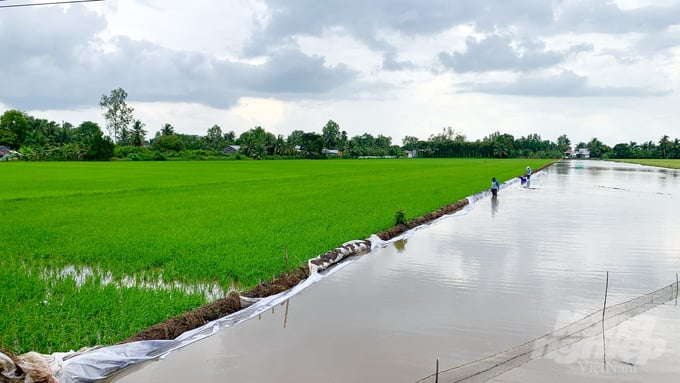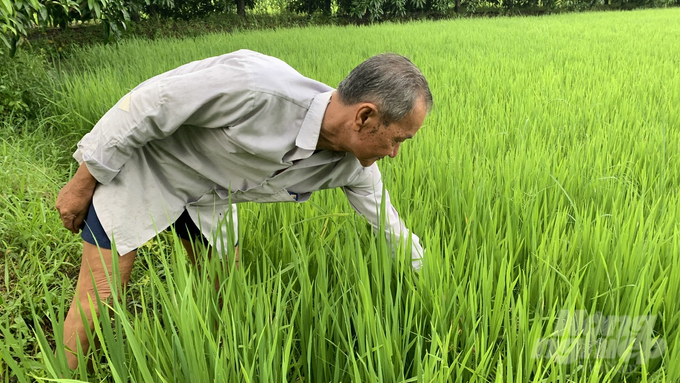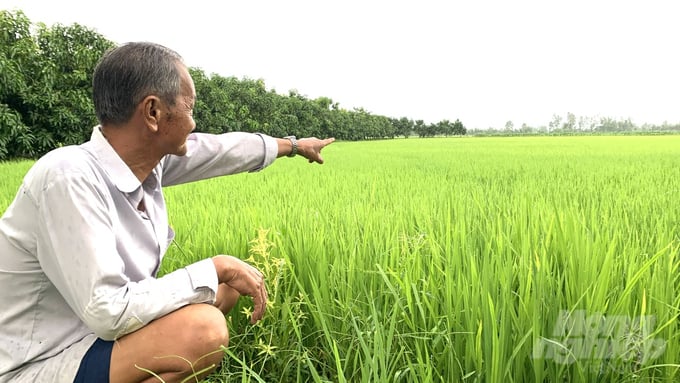June 20, 2025 | 11:53 GMT +7
June 20, 2025 | 11:53 GMT +7
Hotline: 0913.378.918
June 20, 2025 | 11:53 GMT +7
Hotline: 0913.378.918

During the rainy season, members of the cooperative work diligently to cover rice fields. Photo: Ho Thao.
The late-August rain was also the time we arrived at Binh Hieu Agricultural Cooperative (Long My town, Hau Giang province). This is a low-lying area, located in the heart of Hau Giang. Every year farmers work hard through two rice crops. Usually in June and July lunar calendar, rainwater turns the low fields into a picture of pure white.
During our conversation, the head of Binh Hieu Agricultural Cooperative Nguyen Van Huyen said, "We are not only neighbors, but also teammates". Mutual support, efforts to overcome difficulties and the spirit of working together have brought them together.
Binh Hieu Agricultural Cooperative is currently focusing on growing two main rice varieties, OM18 and OM5451. Considering the special conditions of the land of Long My, these rice varieties are suitable for the soil characteristics, bringing strong growth to the crop.
In the past crop, members of the cooperative were full of excitement after seeing such success in productivity. On average, each cong (Vietnamese measurement, 1 cong equals 1,000 m2) of land can harvest approximately 7 tons of rice/hectare and the selling price ranges from VND 7,000 to 7,500/kg. After deducting fertilizer costs and other factors, farmers gain a profit of VND 3 million/cong.
What made Mr. Cu excited was that the cooperative was able to sell rice at a price VND 1,000 /kg higher than the market price. This success came from the association with the Southern Food Corporation and the Mekong Delta Rice Research Institute, partners who provide rice seeds and ensure output for farmers.

Farmer Tran Van Minh has signed a contract with Binh Hieu Agricultural Cooperative with the offered selling price being VND 7,000/kg. Even when the market increases the price to VND 8,000/kg, Minh insists on complying with the contract as he believes it is an important foundation for maintaining reputation and prestige. Photo: Ho Thao.
According to Huyen, in the recent crop, although the price of rice seeds from the Southern Food Corporation has increased significantly (VND 18,000/kg), what people need now is to have enough seeds to implement the rice growing area expansion plan.
“Now the big challenge is climate change with unstable weather, often changing between sunshine and rain, not to mention climate extremes. This requires farmers to invest a lot to pump water to the fields while facing the risk of flooding due to heavy rain. The cooperative often holds meetings to exchange techniques on seasonal sowing and compliance with the sowing schedule,” he said.
Every half a month, Binh Hieu Agricultural Cooperative holds a meeting to discuss important policies. The cooperative has expanded its operations by investing in more transplanters and also agreed to buy more combine harvesters and drones to serve their members. The main goal of the cooperative is to develop a safe production model that will become widespread among the community.

For the upcoming crop, Binh Hieu Agricultural Cooperative plans to double the planting area, from 100 ha to 200 ha. Photo: Ho Thao.
Since mid-July, leading rice exporting countries including India, UAE and Russia have banned the export of non-basmati rice. An increase in purchases of food reserves amid concerns about climate change has led to a supply-demand imbalance and a sharp increase in rice export prices.
In fact, localities in the Mekong Delta have recorded an increase in rice prices of VND 800 - 1,000/kg compared to the previous crop year. This opens up great opportunities to increase farmers' income during the 2023 winter-spring rice crop.
The current situation of rice farming in the winter-spring crop of 2023 in Hau Giang province shows that the planted area exceeds 22,300 ha, accounting for more than 91% of the total planned area (24,500 ha), with the advantage of rice varieties OM18 and OM5451 being put to maximum efficiency.
According to Vo Xuan Tan, Director of Hau Giang Agricultural Extension Center, the province is trying to implement a support program for cooperatives and agricultural collectives. This initiative includes supporting the selection of rice varieties, providing organic fertilizers and agricultural chemicals, and promoting organic farming. At the same time, the subsidy of 50% of the value of rice seeds has also been expanded so that people can spend resources to purchase advanced scientific and technical machinery and equipment.
Translated by Samuel Pham
![Turning wind and rain into action: [9] Digitizing hydrometeorological data in response to climate change](https://t.ex-cdn.com/nongnghiepmoitruong.vn/608w/files/news/2025/06/17/z6704423696987_15fd32ffc26d590d204d520c9dac6786-nongnghiep-165943.jpg)
(VAN) Farmers have begun accessing hydrometeorological applications to adjust their cropping schedules, aiming to ensure productivity and adapt to climate change.
![Turning wind and rain into action: [8] Real-time salinity detection and early warning technology](https://t.ex-cdn.com/nongnghiepmoitruong.vn/608w/files/news/2025/06/17/z6704423696987_15fd32ffc26d590d204d520c9dac6786-nongnghiep-151127.jpg)
(VAN) Thanks to the integration of modern hydrological-hydraulic models, remote sensing technologies, and artificial intelligence, the accuracy of hydrological forecasting has significantly improved.
![Turning wind and rain into action: [7] Early disaster warnings help marine farmers minimize losses](https://t.ex-cdn.com/nongnghiepmoitruong.vn/608w/files/news/2025/06/17/z6704423696987_15fd32ffc26d590d204d520c9dac6786-nongnghiep-142942.jpg)
(VAN) In recent years, thanks to early disaster warnings and forecasting, marine farmers in Khanh Hoa province have been able to reduce risks and losses, thereby improving production efficiency.
![Turning wind and rain into action: [6] ‘Four on-the-spot’ disaster management software](https://t.ex-cdn.com/nongnghiepmoitruong.vn/608w/files/news/2025/06/17/e5a48259d6a262fc3bb3-nongnghiep-183800.jpg)
(VAN) By simply activating the scenario on the disaster management software, the relevant authorities immediately know how many households need to be evacuated, where to evacuate them to, and by what means of transportation…
![Turning wind and rain into action: [5] Hue applies modern technology in disaster forecasting](https://t.ex-cdn.com/nongnghiepmoitruong.vn/608w/files/news/2025/06/17/z6704423696987_15fd32ffc26d590d204d520c9dac6786-nongnghiep-093938.jpg)
(VAN) In Hue city, modern technology has recently been applied in meteorological and hydrological forecasting and warning, helping to reduce the damage caused by natural disasters.

(VAN) A cutting-edge farming technique being implemented on an experimental ranch in Arizona's Sonoran Desert has already saved a billion gallons of water over five years, according to Civil Eats.

(VAN) Poultry and pig production and the environment can be boosted through enhanced water technology, according to new research.